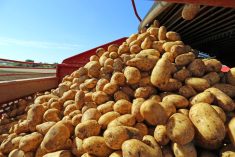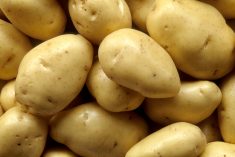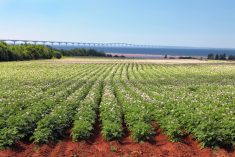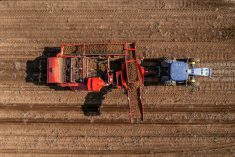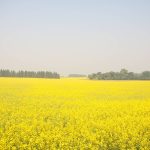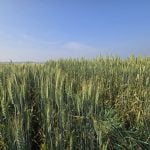A label expansion for Syngenta’s Aprovia fungicide, to cover additional soil-borne potato diseases, makes it the first fungicide in Canada approved to suppress verticillium wilt in potatoes.
Fumigants have been potato growers’ only option against the crop disease until now, Eric Phillips, Syngenta Canada’s fungicides and insecticides product lead, said in a release Thursday.
Verticillium wilt, the company said, is “one of the main contributors” to potato early dying complex, which is “widespread across many growing areas, but difficult to identify and effectively manage.”
The label expansion, Phillips said, means Aprovia “can be included as part of a grower’s soil disease management plan to help protect potato quality and yield.”
Read Also

India slaps 30 per cent import duty on yellow peas
India has imposed a 30 per cent duty on yellow pea imports with a bill of lading date on or after Nov. 1, 2025.
In Aprovia the active ingredient — benzovindiflupyr, a Group 7 (SDHI) fungicide which Syngenta markets under the name Solatenol — is packaged as an emulsifiable concentrate at 100 grams per litre of product.
Its label covers it for “broad-spectrum” control or suppression of listed diseases — including several rusts, leaf spots and powdery mildews — in crops such as potatoes, fruiting vegetables, grapes, pome fruit (apples, pears), blueberries and cucurbits such as cucumbers and squash.
In potatoes, the expanded label clears Aprovia for in-furrow suppression of verticillium wilt at 750 millilitres of product per hectare (300 ml/acre). At 100-centimetre row spacing, for example, that translates to 7.5 ml of product per 100-metre row.
When applied in-furrow at planting, Syngenta said, Aprovia “works from within the plant to help reduce the foliar symptoms of verticillium wilt that appear later in the season.”
Aprovia’s label also covers suppression of silver scurf and Rhizoctonia solani, the cause of stem and stolon canker and black scurf, at rates of 500 to 750 ml per hectare (200-300 ml/acre) of potatoes.
Maximum residue limits (MRLs) for Aprovia have so far been established for markets in Canada and the U.S., the company said. — AGCanada.com Network



